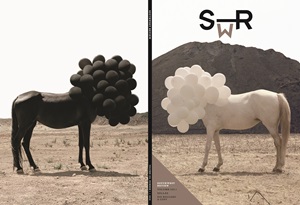Greg Brownderville
The New Southwest Review: SMU’s Literary Magazine, One of America’s Oldest, Reinvents Itself
Under the leadership of Professor Greg Brownderville, Southwest Review continues to embrace new voices while recognizing a rich history.
I recently took over the editorship of America’s third-longest-running literary quarterly, Southwest Review (SwR), which was founded in 1915 and is published under the aegis of Southern Methodist University. As the new editor, I’m determined to broaden the magazine’s reach and readership, and I aim to start right here at home, with the SMU community. Let me paint you a picture of what SwR has been and what it is rapidly becoming.

The last issue of 2017 marked an important event in the history of the magazine: our first redesign and relaunch since the 1980s. We enlisted the help of a firm called Pentagram—in particular the award-winning Austin designer Julie Savasky. We are delighted with the new look and feel, and we think you will be, too. Last week saw another landmark moment for SwR: we made our digital debut with SouthwestReview.com, a full-scale website with exclusive text, art, photography, video, and audio. Visually the website is modeled after Savasky’s beautiful designs for the print edition, and the content mixes literary gravitas with a keen sense of fun and aesthetic daring. In other words, we are moving forward, not resting on our laurels.
It could be tempting for any magazine that boasts a long and rich history to try to live on glories past. SwR, after all, has featured many important writers, including D. H. Lawrence, Arthur Miller, Tennessee Williams, Robert Penn Warren, Allen Ginsberg, Annie Dillard, and Anne Carson. Four Nobel Prize winners—Saul Bellow, Naguib Mahfouz, Nadine Gordimer, and Orhan Pamuk—have published inside our covers. The magazine is also known for eyeing talent before it becomes widely recognized. In 1960, SwR printed a poem by an unknown Texan named Larry McMurtry, followed a year later by an excerpt from his debut novel. On our centennial, former fiction editor Ben Fountain remarked, “The roll call of heavyweights who’ve appeared in its pages stands up to any American magazine, large or small, of the past 100 years.” Some older literary magazines, intimidated by their own extraordinary pasts, shy away from aesthetic risk, from the weird and the wondrous, from anything with too much edge.
 SwR, by contrast, embraces newness. We believe a magazine can be fun, contemporary, and sophisticated all at once. Hipness and heft, as far as we’re concerned, are not opposing virtues. On our website we will certainly be dusting off some amazing material from SwR’s extraordinary archives. At the same time, our focus is on the here and now, and we pride ourselves on being as adventurous and open as any indie startup. Also significant is that our cultural view is global. We will bring you exciting work from international storytellers and poets who are currently little known, if at all, in the U.S. As we reflect on our past and look ahead to the future, SwR’s goal is to inspire new ways of connecting with the world. Simply put, we think writing should be as comprehensive and far-reaching as twenty-first century life itself.
SwR, by contrast, embraces newness. We believe a magazine can be fun, contemporary, and sophisticated all at once. Hipness and heft, as far as we’re concerned, are not opposing virtues. On our website we will certainly be dusting off some amazing material from SwR’s extraordinary archives. At the same time, our focus is on the here and now, and we pride ourselves on being as adventurous and open as any indie startup. Also significant is that our cultural view is global. We will bring you exciting work from international storytellers and poets who are currently little known, if at all, in the U.S. As we reflect on our past and look ahead to the future, SwR’s goal is to inspire new ways of connecting with the world. Simply put, we think writing should be as comprehensive and far-reaching as twenty-first century life itself.
As a poet accustomed to the solitary, silent labor of the imagination, I have never fancied myself a salesman, and yet here I am with a pitch. I ask you to take a chance on Southwest Review by subscribing today. You can do so online, right here. Yes, it’s a way of supporting SMU, Dedman College, and the humanities in general. But also: we simply think you’ll love the magazine.
SwR Deputy Editor and Web Editor Robert Rea contributed to this story.